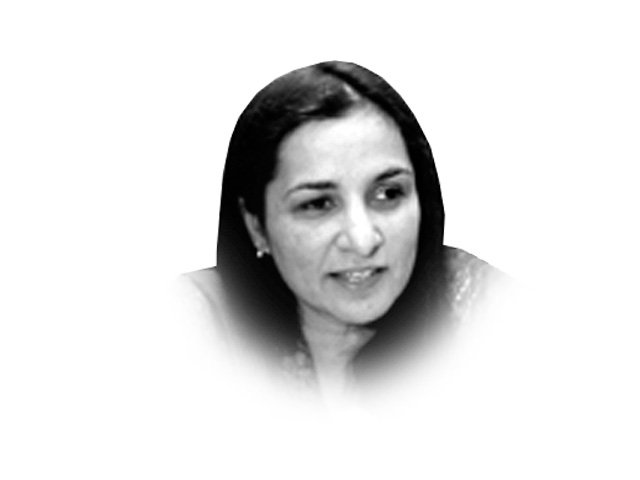
Of course, the government could have categorically stated as its Information Minister Senator Parvez Rashid did on June 9, in my programme, that we will submit “nicely” to the Court that proceeding against the former general was not a priority. What the information minister said reflected one strand of thinking within the party. Earlier in his April 30 interview with me, Mian Nawaz Sharif had said that “I am legally bound to take the case to Court and I will do that. The Court, he said, would decide whether or not Article 6 will apply. Interestingly, in that interview, he disagreed with me that a truth and reconciliation commission would be sufficient to amicably clear up past accounts of blunders. He said, “How would future acts of treason be prevented if no one was tried for treason?”
There are two views in the country. According to one, the country is going through a very difficult period which requires the government’s full concentration on resolving the problems at hand. The other view argues that unless a military ruler is not tried in Court for trashing the Constitution, the road to future martial laws will remain open. Both views have merit. Even the information minister made the argument of prioritising issues rather graphically. He said in my June 9 programme that “if on the one hand a dog is stealing milk, while at the same time my child is drowning, what would I choose? Naturally, I will save my child.”
However, as we have seen that multiple factors, no less the activist judiciary, which also is indirectly an interested party, the PML-N’s own political chanting, egging on the PPP to invoke Article 6 and finally the section of the public opinion calling for former military ruler’s trial did not leave the government the option of pushing the Musharraf case on the back-burner.
Pakistan’s difficult political history, and by extension its socio-economic and ideological dilemmas and difficulties have their roots, to a great extent, in trashing of the Constitution. So, calling for accountability is necessary.
The challenge, however, is to turn this legally correct move into a wise one. Three factors are important. One, the government should pursue it calmly and soberly, not as hounds on a hunting spree. It’s not a time to open a new front; the law must be upheld but sensibly and with humility. Two, this case must not be pursued at the cost of other pressing problems. The public wants the government to resolve the issues ranging from acute crises of internal security to the acute crisis of load-shedding. Neither the country nor its people have the stomach for any witch-hunts or vendetta-prone politics. Three, the government and the media must frame this case, not as a score-settling between the military and the PML-N or the military and Pakistan’s political class, but as legal action against an individual who trashed the Constitution. That the individual, too, will get justice as he deserves according to law, is a point that needs to be reiterated.
Meanwhile, from the army leadership, the maturity that the army chief has shown until now, is expected in the coming months, especially with the government’s decision to take the case to Court. How the army views it, will depend not only on how the government and the media frame it, but also on how the military leadership interprets it for the institution.
As we now wait for the legal curtains to be raised on what can be billed as one of Pakistan’s most historic cases, there will be multiple, and not always comfortable, questions that will be raised. Why not the October 1999 coup? Only because the Supreme Court judges indemnified the actions? The indemnity argument regarding the October 1999 coup is nullified under the Eighteenth Amendment. As the case goes to Court, the many-sided battles, involving multiple actors will expose the contradictions, the grey areas and the indemnities. Some argue that the chief justice himself could be dragged in and those serving as the governors, corps commander and the three chiefs during Musharraf’s time can fall in the collaborators category.
These are all facts, not ones that we should be scared of. The invoking of Article 6, provided it is handled wisely, will go down as another landmark in the maturing of the Pakistani nation.
Published in The Express Tribune, July 1st, 2013.
Like Opinion & Editorial on Facebook, follow @ETOpEd on Twitter to receive all updates on all our daily pieces.
COMMENTS (13)
Comments are moderated and generally will be posted if they are on-topic and not abusive.
For more information, please see our Comments FAQ


1729080111-0/BeFunky-collage-(63)1729080111-0-165x106.webp)
1730838202-0/Trump-(1)1730838202-0-165x106.webp)








Problem in pakistani is that there are too many self appointed analysts - read anchor persons - and too few subject speciallists. Same two dozen people have oponion on everything. Most of these analysts are affiliated with media groups who are affiliated with political parties.
@Mirza: Balochistan and the people of Balochistan were much much better placed then of course barring few disgruntled anti state elements who are extortionists, murderers, opportunists, self centered, driven by vested interests and so on...we should not blame Musharraf for every bad thing that has happened and neither we should try to find refuge in Mush's doings to cover our own inadequacies. With regards to people of Balochistan, no one but the their own Waderas and so called political leadership has let the Balochis down and they still remain a perpetual stumbling stone in the development of Balochistan. Lets hope for the sanity to prevail....
Nice article Nasim Zahra. Congratulations. I wish they heed to it. I dont expect anyway. There is a HEAVY mandate.
FEAR has two paths:" Forget everything and run".....or "Face Everything and Rise". To me it seems Pervez Musharraf has choosed the second path.
If I am given opportunity to defend Musharraf, I will blast the home made case in just two days. This judicial dramas has no legal standing
Courts have become fully involved in politics and cannot be trusted in political cases. They have full time political workers organized through Bars. They even have judicial goons who are used for arm twisting. They either block justice or expedite it for their vested reasons. They have taken full advantage of the weak & corrupt PPP government and have effectively impaired the executive by defamation and made it dysfunctional. They have now turned guns against the Armed Forces of Pakistan, the only functioning organ of the state. In the name of rule of Law, they are challenging every act taken in line of duty. The officers of the armed Forces who have constitutional protection while performing state duty are frequently being harassed and cases are initiated. This must be taxing military leadership in such difficult situation. Musharraf’s case too is selective in nature. Article 6 cannot be applied to him on invoking article 232 of constitution. It is too well understood.
Justice must be seen. Musharraf should not fall victim of political and judicial revenge. How can we expect him to get justice as parties who were directly effected by the measures are heading the government and jury. All of them including Prime Minister and Chief Justice must be interrogated by a neutral investigation body. Not only Musharraf even CJ is responsible for legitimating his moves and taking oath under PCO. If matters from 1956 are taken into consideration Nawaz Sharif would also be considered as culprit for his past deeds in the time of Zia martial law and attacking SC.
The author has expressed the second view as,'the other view argues that unless a military ruler is not tried in the court for trashing the constitution,the road to future martial laws will remain open'. Following points needs to be considered in this respect:- 1) How come the army as an institution will not be on trial,when the aim infact is to stop future army interventions. Other wise, next time, theoraticaly,the institution collectively could declare martial law.This also imply,that all collaborators,abettors etc should be tried as envisaged and rightly desired by the article 6 of the constitution and not only Musharraf.Only his selective trial could be highly counter productive. 2) As a matter of fact all military take overs and imposition of emergency were institutional endeavours and not solely of their Chief.Imposition of Emergency of Nov 3,2007 had the additional consent of the elected government and the Assemblys of the time.It was also indemnified by the SC of the time as per the precedent set on Oct 99 and Jul 77 take overs by the then SC after making of the 1973 constitution.18th amendment of the constitution has only declared them as of no legal effect retrospectively,and is contrary to the judgements of the SC and Assemblys of that time. 3) When viewed in the above context Musharraf and all are legally well covered.They have very strong legal defence avaliable.Conviction/ punishment are most likely to be percieved as vengeance with grave implications. It also imply that either try all or none atleast from Jul 77 onwards. 4) The reaction of entire institution of armed forces is important and not only that of military leadership.
Of course the govt should take care of the more urgent problems the public has elected them for. The fact is a few govt lawyers not the whole cabinet would be busy in Mush's case. It would be the SC and AG who would be the main parties beside Mush not all the govt including PM would be busy in the SC. Let us give credit to our elected govt that they can walk and chew gum at the same time!
I agree this case should be decided by the SC and not by any politician. However, it is the duty of the Attorney General to present the case in front of the court and argue for it. There is almost unanimity among major political parties to try Mush in the SC. The two largest parties in the country agree on this issue and it would help calm the people of Baluchistan to great extent. Mush deserves his day in the court like any other Pakistani.
Very sane and timely advice by a knowledgeable person. How a person who himself is a product of a dictator thinks himself innocent of the same crime he thinks others must be tried and punished.
There is big Q.. why the article 6 to be applied form 2007, why not from 1999? ..and why only Musharraf to be answered, why not those who took oath under the constitution and helped Musharraf during emergency.
Why Supreme court didn't ask PPP government in 5 years to file a case against Musharraf, and why only when NS is in power... why SC didn't held Musharraf accountable immediately after stepping down from Presidency, .. this all cooked up to spoil Army's name as an Institution and Musharraf particularly.
There are very few people who will ask for Musharraf's trial.. Politicians are in Joint Venture for their own benefits.